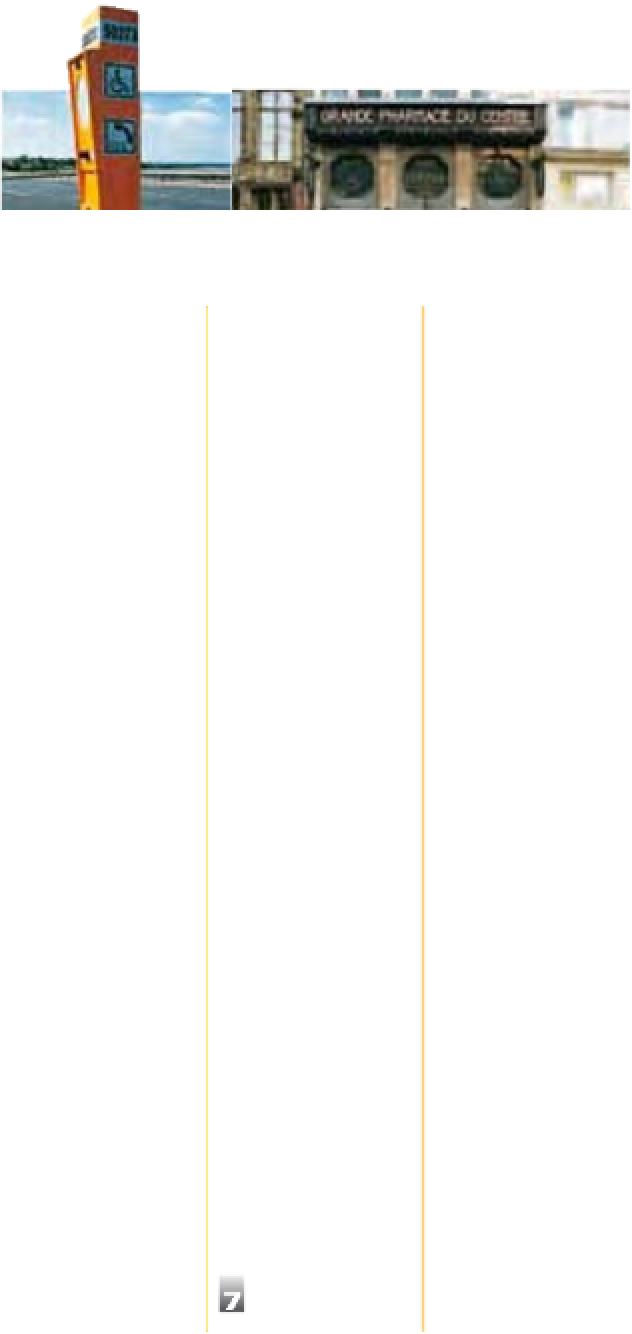Travel Reference
In-Depth Information
left
An emergency telephone on a motorway
Right
A
pharmacie
(chemist)
Security and Health
Emergencies
In a medical emer-
gency, contact the 24-hour
Service d'Aide Médicale
Urgence, which can send
a doctor, an ambulance,
or paramedics in a mobile
intensive care unit, as
appropriate. For all but
the most serious emer-
gencies, payment in cash
is required immediately
after treatment. d
Service
d'Aide Médicale Urgence.
01 47 07 77 77
Breakdowns and
Car Accidents
If your car breaks down,
place the red warning
triangle which French law
requires you to carry
(see
p116)
50-100 m (160-300
ft) behind it. If you have
an accident, telephone
the emergency services
(see box)
.
Postes d'appel
d'urgence
(emergency
telephones) are posted at
2 km (1 mile) intervals on
autoroutes
, 4 km (2.5
miles) on dual carriage-
ways; they will connect
you with rescue services
via the traffic police.
able to recommend an
English-speaking doctor,
or put you in touch with
the 24-hour
médécin de
garde
(doctor service)
that operates in every
major town. If not, consult
your local pharmacist or
the telephone operator.
Dentists
Dentists are listed in
local Pages Jaunes (Yellow
Pages). In an emergency,
they will see you at
major hospitals.
Travel Insurance
Health care in France
is excellent but expensive,
so be sure to take out
adequate insurance to
cover any medical emer-
gency. Visitors from EU
countries should addition-
ally collect an E111 form
(entitling you to free basic
health care) from a post
office before departure.
Documents
Always carry some
form of identification
with you, and have your
driving licence, insurance
and car registration
documents to hand when
driving. If you are stopped
by the police, failure to
produce them may result
in an on-the-spot fine.
Pharmacies
Pharmacies
(chemists)
- indicated by a green
cross - are usually very
helpful in treating minor
ailments and injuries. If
necessary, they will also
direct you to the nearest
doctor. Normal opening
hours are 8 or 9am-7pm
Monday to Saturday, but
one duty pharmacy in
every town stays open at
night and over weekends;
others will post the
address on their doors.
Crime
Generally speaking,
Normandy is a pretty
safe place to travel;
violent crimes, such as
assault and rape, are
comparatively rare. Most
crime involves theft -
particularly from cars.
Pickpockets and bag-
snatchers tend to operate
in city centres, usually in
crowded places like
railway stations, trains
and buses, and bars and
clubs. If you are unlucky
enough to have anything
stolen, report it to the
nearest police station
straight away, and ask for
a copy of the police
report for your insurers.
Lost Passport
If you lose your pass-
port, report it to the police
immediately. Next, inform
your embassy or consul-
ate; most are in Paris, but
some are based in Rouen.
Make copies of all your
important documents and
keep them separately.
Hospitals
If you have an acci-
dent or become ill in the
night, go to any public
hospital's
service des
urgencies
(accident-and-
emergency department).
Be warned: you will have
to pay for your treatment
straight away.
Emergency Phone
Numbers
Police
17
Ambulance
15
Fire Brigade
18
Doctors
If you are staying in a
hotel, staff should be
124
















